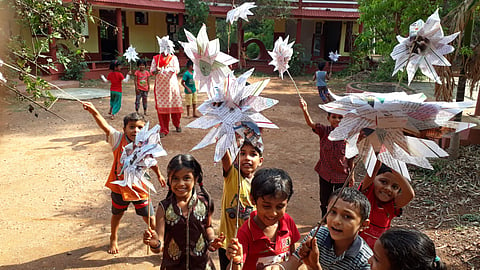

When Sanjeev Kulkarni and his wife Prathiba Kulkarni were searching for schools that impart education through interactive methods, they didn't find one. All they saw were the usual schools that adopt rote learning methods with no room for children to think logically or question the science behind it. So, they came to a decision to start their own school that doesn't stress only on academics but on overall learning using unique methods. Thus Baala Balaga School came into existence in 1996 in Dharwad.
Where it all began
Prathiba recalls, "It was not just our son that inspired us to start this school, we had read this Japanese book called Totto-Chan: The Little Girl at the Window written by a Japanese author, Tetsuko Kuroyanagi. This book shows you why we need to give more freedom of expression to our kids. We had read several such books that made us realise the need for schools where students learn through experiments and interaction. Initially, there were only three kids and the school began in the verandah of our residence. It was also called Totto-Chan Putani Makkala Shaale. Unlike other nursery schools, we never taught them to write the alphabet on the first day of the school. We started with small stories, music and painting. The same method has been followed at Baala Balaga till date. Later when the word spread, the school in our verandah had over 13 kids at the end of that academic year. With our target group being middle class and poor families, parents loved what we were doing and encouraged us."
The couple never planned to run a bigger school like the one that exists today near Karnataka University. As they observed the success rate every academic year, they went on increasing the grades to admit more kids. "Initially, it was just nursery, then we started LKG, UKG, class I and today, we teach students until class X. With the increasing strength of our school and our focus being mainly activity-based learning, we moved to a bigger campus. At Baala Balaga, we ensure to keep our classrooms quite interactive, child-friendly and nature-friendly. Unlike most other schools where children are admitted in large numbers, we admit only 25 to 30 kids in every grade. This makes it easy for our teachers to focus on each child and talk to them in a friendly manner and bgive them enough time and space to ask questions. Aside from this, the medium of instruction until class VII is Kannada because it gives children freedom to express what they think in a language they know. But that doesn't mean we ignore English. Children learn English like any other subject and we use it as a medium of instruction only from class VIII to X."
Interactive learning at Baala Balaga
While the new National Education Policy (NEP) asks school to focus more on interactive and activity-based learning, Baala Balaga already has it in place. Prathiba says, "What we do at our school is we ask children to solve puzzles, paint, cut pictures from magazines or newspapers and explain the story behind those and other such activities. These also focus more on eye-hand coordination like making models from clay, drawing rangolis etc. We also ensure that there is no gender bias among children when it comes to performing activities. Everybody has to participate in every activity."
Aside from these activities meant for kids below 12 years old, Prathiba and her team also organise visitors' activities. Under this, any parent who is interested in involving themselves with the kids can come forward and participate — they can host storytelling sessions, educate kids about hygiene, dental education and so on. This makes it more interesting for kids as they get to see their own parents teaching. She further adds, "As a part of our activity, what we do is we bring great personalities to our school. For instance, we once brought H S Doreswamy, the freedom fighter, to our school. He shared his experience with us and the children were quite excited to know about India's fight for freedom. Even Rajmohan Gandhi, grandson of Mahatma Gandhi visited our school once. Similarly, we bring researchers and scientists who have worked on notable projects across the country. This helps them relate to the lessons they have studied."
Another unique activity that they have is Seva Cafe for class X children. As per this programme, these students are supposed to cook food at the kitchen in Baala Balaga. Why cook when it is time to study? Prathiba believes that it is essential for children to have a basic knowledge of what happens at a kitchen. "From buying vegetables to plating the food, the students will experience everything on a particular Saturday. The students are divided into different groups and assigned particular tasks on that day. They prepare breakfast or lunch systematically under the guidance of their teachers. Through this, most of the children will understand the science behind eating healthy food."
Another unique factor of Baala Balaga is they doesn't like to impose wearing a particular uniform on children. Hence, every day is a no uniform day at school. Children wear colourful yet simple clothes
Baala Balaga gone online
With no chance to begin regular classes due to the pandemic, the teachers have been organising activities online. "The kids are given simple activities so that they can use things available at home to prepare rather than go out frequently. Sometimes, we give them simple activities like choosing a particular flower and observing its features and changes. We are making it simple and easy for kids of Nursery to class VII by recording videos of activities and sending it to their WhatsApp number. However, for class VIII to X, we conduct online classes. Currently, the strength of our school is 250 children. Once the State Government permits the opening of schools, we will follow the protocols and run our classes," she concludes.
